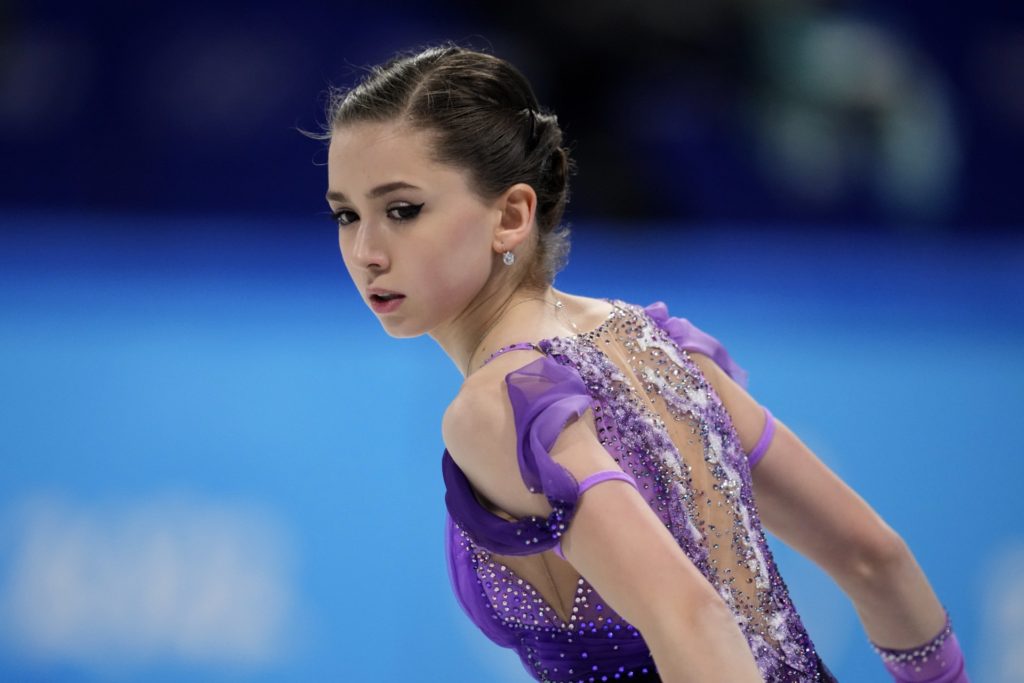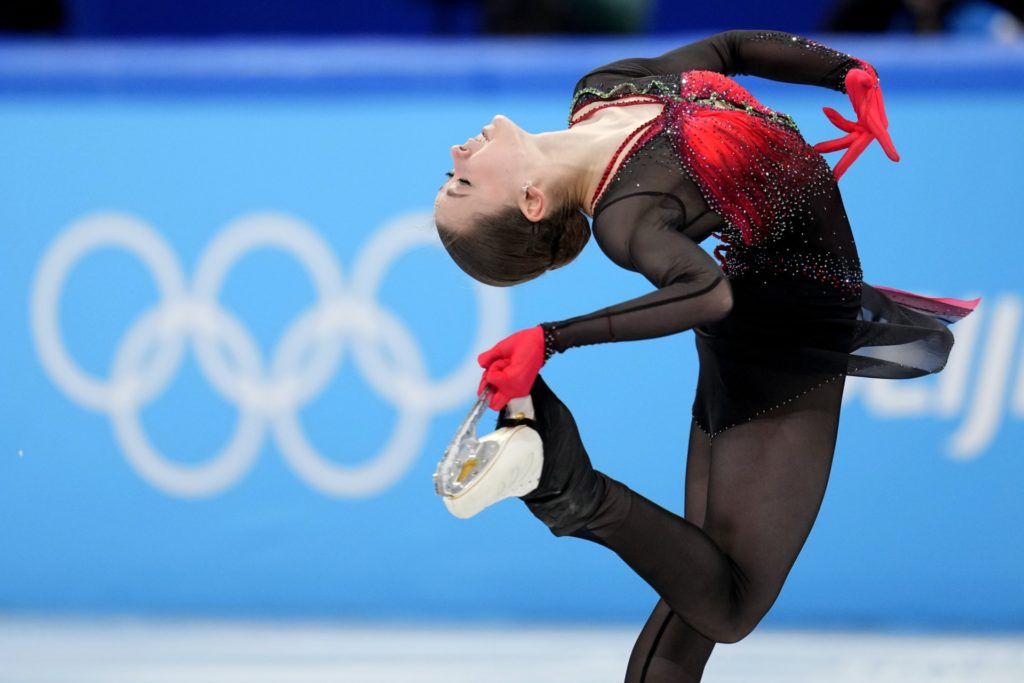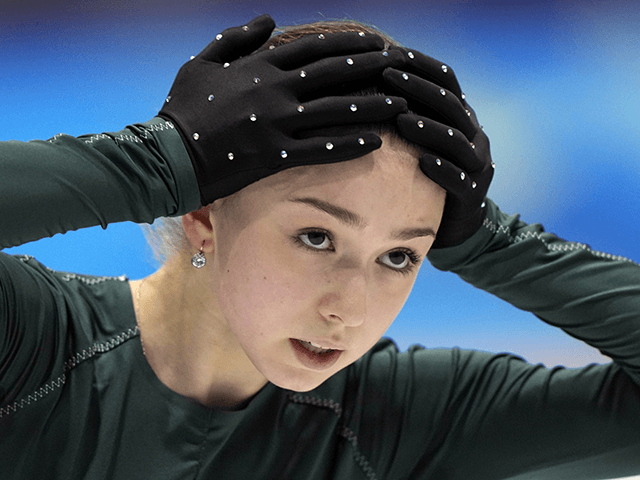Fifteen-year-old Russian skater Kamila Valieva, bizarrely permitted to continue competing in the disastrous Beijing Winter Olympics after failing a drug test, claimed through her lawyers Tuesday that she might have drunk from a water glass contaminated by her grandfather’s heart medication.
Valieva has been largely silent since the doping scandal broke last Thursday. Her explanation was made public on Tuesday by Denis Oswald, a member of the International Olympic Committee, and by Russian media reports quoting her lawyer Anna Kozmenko.
“There can be completely different ways how it got into her body,” Kozmenko speculated. “For example, grandfather drank something from a glass, saliva got in, this glass was somehow later used by an athlete; or the drug lay down on some surface, traces remained, the drug lay down on this surface, which the athlete then drank.”
Oswald confirmed that Valieva’s official explanation for the trimetazidine found in her system was “contamination which happened with a product her grandfather was taking.”

Kamila Valieva, of the Russian Olympic Committee, warms up before the women’s short program during the figure skating at the 2022 Winter Olympics, Tuesday, Feb. 15, 2022, in Beijing. (AP Photo/Natacha Pisarenko)
Trimetazidine is prescribed for angina, although very rarely to someone as young as Kamila Valieva. It can also be used as a performance enhancer, since it improves the efficiency of the user’s heart.

Kamila Valieva, of the Russian Olympic Committee, competes in the women’s team free skate program during the figure skating competition at the 2022 Winter Olympics, Monday, Feb. 7, 2022, in Beijing. (AP Photo/Natacha Pisarenko)
The Court of Arbitration for Sport (CAS) apparently accepted the grandfather theory, because it ruled on Monday that Valieva can compete in the women’s skating event. However, the IOC said there would be no medals ceremony if she wins, as widely expected.
“These days have been very difficult for me, emotionally. I am happy but emotionally fatigued. That is why these tears of joy and a little bit of sadness. But, of course, I am happy to take part in the Olympic Games. I will do my utmost to represent our country,” Valieva said on Tuesday when she finally spoke about the controversy in a Russian television interview.
Other competitors at the Beijing Winter Olympics were stunned when Valieva was cleared to compete after testing positive for drugs, Yahoo Sports reported Tuesday:
“I think it’s completely unfair to the rest of the competitors,” Zhu Yi of China told Yahoo Sports. “And of course, to herself, she’s an amazing skater, I think. There’s no need for doping.”
“Something inside of me thinks it’s sad,” Sweden‘s Josefin Taljegard said. “I think it’s sad. But, here we are.”
“I am so angry. The ladies event tomorrow is a complete joke,” former Team USA skater Adam Rippon said Monday on Twitter. “So many Olympic experiences stolen from clean athletes who got here without the help of performance-enhancing drugs. What a shame.”
Rippon called the Russians “dirty cheaters” and “child abusers.” He wondered “how the Olympics recovers from this.”
“They shouldn’t be here at the Olympic Games. They’re clowns,” he said, referring to Russia’s ban for an earlier doping scandal, which prevented the team from competing under the Russian flag as its national team in Beijing.
The World Anti-Doping Agency banned Russia from international sports competitions in 2019 after a years-long investigation uncovered a massive state-sponsored doping scheme at the 2014 Sochi Winter Olympics. The Russians were further accused of attempting to thwart the investigation by manipulating and concealing medical data.
The initial four-year ban was subsequently reduced to two years in arbitration, leaving it set to expire in December of this year. Until then, Russia’s flag and national anthem are not permitted at international events, and Russian athletes must compete as part of a theoretically “neutral” organization called the “Russian Olympic Committee” or ROC. Critics said this compromise turned the entire ban into a purely technical exercise instead of real punishment.
Time quoted more surprised and angry responses from current and former Olympians, including from American sprinter Sha’Carri Richardson, who was banned from the 2021 Tokyo Games after she tested positive for marijuana.
Former Olympic gold medalist Tara Lipinski, covering the Beijing Winter Games for NBC, said she was astounded to see Valieva glide out onto the ice after testing positive for drugs.
“To be honest, I almost don’t believe what I’m seeing. Seeing her on Olympic ice right now with everything we’ve discovered over the last week. I did not think this was going to happen and I don’t think it should be happening,” Lipinski exclaimed.
Many of the athletes in Beijing expressed sympathy for Valieva because of her youth, placing blame for the scandal on her coaches and handlers. Some were angry the medal ceremony was canceled for the team event in which Valieva participated, although the Russians were allowed to keep the gold medal she helped to earn, and said it would be deeply unfair to other medalists if the upcoming women’s event has no medal ceremony because Valieva wins.

COMMENTS
Please let us know if you're having issues with commenting.